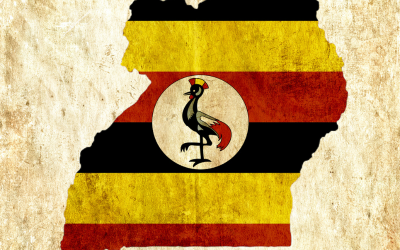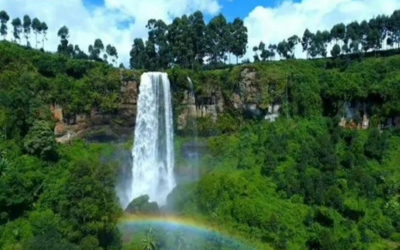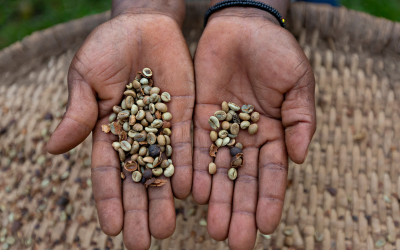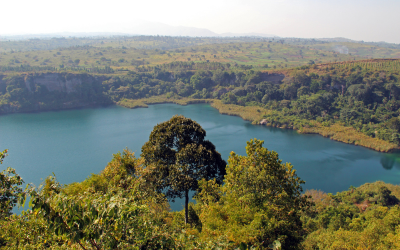A Journey Through Uganda’s Coffee Heritage
Posted by Simone, The Coffee Girl on 3rd Sep 2024
Discovering the Unique Flavour of Sipi Falls Coffee: A Journey Through Uganda's Coffee Heritage
Nestled on the slopes of Mount Elgon in eastern Uganda, Sipi Falls is not only famous for its breathtaking scenery but also for producing some of the most exquisite coffee beans in the world. The Sipi Falls region is a hidden gem for coffee enthusiasts, offering a unique blend of flavours that reflect the region's rich natural environment. Among these treasures is the Sipi Falls organic, natural anaerobic process coffee bean—a product that embodies the perfect marriage of traditional farming techniques and modern coffee processing methods.

The Essence of Sipi Falls Coffee
The Sipi Falls coffee bean stands out due to its distinct processing method. The anaerobic process involves fermenting the beans in an oxygen-free environment, which enhances the bean's natural flavours and creates a unique, complex taste profile. This process is relatively rare in the coffee world, and when applied to the organically grown beans of Sipi Falls, it results in a coffee that is truly exceptional.
The Sipi Falls region, with its high altitudes, fertile volcanic soils, and cool climate, provides the perfect conditions for growing coffee. The combination of these natural factors and the anaerobic processing method gives Sipi Falls coffee its signature notes of tropical fruit, honey, and citrus, with a hint of floral undertones. The result is a cup of coffee that is both vibrant and smooth, leaving a lasting impression on the palate.

The Organic Advantage
One of the key aspects that sets Sipi Falls coffee apart is its commitment to organic farming practices. The farmers in this region take pride in cultivating their coffee without the use of synthetic fertilizers or pesticides, relying instead on traditional methods that have been passed down through generations. This approach not only preserves the environment but also ensures that the coffee produced is of the highest quality.
Organic farming in Sipi Falls goes beyond just avoiding chemicals. It involves a holistic approach to agriculture, where the health of the soil, water, and surrounding ecosystems are prioritized. Farmers use composting, mulching, and natural pest control methods to maintain the fertility of the land and protect the delicate balance of the local ecosystem. This sustainable approach to farming is not only beneficial for the environment but also results in a coffee bean that is richer in flavour and free from harmful residues.

The History of Coffee in Uganda
To truly appreciate the significance of Sipi Falls coffee, it's essential to understand the broader history of coffee growing in Uganda. Uganda is one of Africa's largest coffee producers, and the crop has played a vital role in the country's economy for over a century. However, the story of Ugandan coffee dates back even further, with deep roots in the culture and traditions of the people.
Coffee is believed to have been introduced to Uganda by Arab traders in the 16th century, though some accounts suggest that the indigenous Baganda people were cultivating a variety of coffee even earlier. This early coffee was not the Arabica variety that we commonly associate with high-quality coffee today but rather a different species known as Coffea canephora, or Robusta. Robusta coffee is native to the region and has been a staple of Ugandan agriculture for centuries.
The British colonial period in the 19th and 20th centuries saw the expansion of coffee cultivation in Uganda, particularly in the central and eastern regions. During this time, Arabica coffee was introduced to the highland areas, including the slopes of Mount Elgon, where Sipi Falls is located. The cool climate and fertile soils of these highlands proved ideal for Arabica cultivation, leading to the development of some of Uganda's finest coffee varieties.
In the years following independence, Uganda's coffee industry faced numerous challenges, including political instability, fluctuating global coffee prices, and a lack of infrastructure. However, in recent decades, there has been a renewed focus on quality and sustainability, with initiatives aimed at improving farming practices, supporting smallholder farmers, and promoting Ugandan coffee on the global stage.
Today, Uganda is recognized as a leading producer of both Arabica and Robusta coffee, with the Sipi Falls region standing out as a prime example of what makes Ugandan coffee so special. The combination of traditional farming methods, organic practices, and innovative processing techniques like the anaerobic process has positioned Sipi Falls coffee as a premium product sought after by coffee connoisseurs around the world.

A Taste of Uganda’s Coffee Future
Sipi Falls coffee represents the future of Ugandan coffee—one that embraces both tradition and innovation. By focusing on sustainable practices and unique processing methods, the farmers of Sipi Falls are not only preserving the rich heritage of Ugandan coffee but also pushing the boundaries of what is possible in coffee production.
For those who seek a coffee experience that is both extraordinary and authentic, Sipi Falls organic, natural anaerobic process coffee beans offer a journey into the heart of Uganda’s coffee culture. With every sip, you are not only tasting a world-class coffee but also supporting the livelihoods of the farmers who work tirelessly to bring this exceptional product to your cup.


